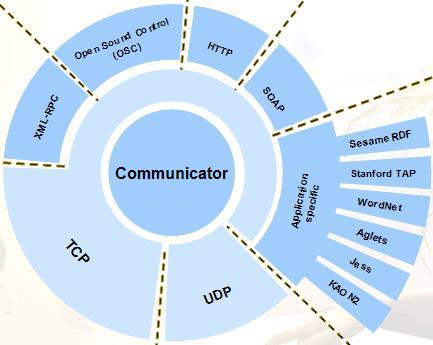AMICO: Documentation / Basic Communication Protocols
 |
|
Basic TCP Communication Protocols
Following table gives a list of all available commands.
| TCP Command (all command have to end with end of line characters "\r\n") | Example | Description |
| UPDATE <variable-name> <value> [<group>] [<description>] | UPDATE age 26 UPDATE name James%30Bond |
Updates the variable. If the variable does not exist, it will be added. Group and description are optional. Name cannot contain empty spaces, while value, group and description have to UTF-8 encoded. |
| UPDATE-DIRECT <variable-name> <value> [<group>] [<description>] | UPDATE-DIRECT age 26 UPDATE-DIRECT name James%30Bond |
The same as the UPDATE command, except that it do not trigger variable derivation transformations. Useful efficient, very frequent updates of variables. |
| DELETE <variable-name> | DELETE age DELETE name |
Deletes the variable. If the variable does not exists, nothing happens. |
| REGISTER [DIFF] <trigger-variables> <template> | REGISTER age User is <%=age%> years old. REGISTER age,name User <%=name%> is <%=age%> years old. REGISTER DIFF message New message: <%=age%> |
Adds a template that will be populated and returned to the application (through TCP connection) when some of the trigger variables changes. Values inside <%=variable-name%> will be replaced with the value of the variable. For example template "User age = <%=age%>", with variable age updated to 27, will be populated to "User age 27". If the variable with a name does not exists, it will be replaced with empty string. If option DIFF is used, than the template is evaluated and send only when the value of the variable is different from previous value, not every time when variable is updated. List of trigger variables cannot have contain empty spaces. Populated templates are sent UTF-8 encoded. |
| POPULATE TEMPLATE <template> | POPULATE TEMPLATE Value of variable age is <%=age%> | On request population of templates. |
| GET <list-of-variables> | GET age GET age,name |
Returns comma separated, UTF-8 encoded list of values for given variable names. |
| GETXML <list-of-variables> | GETXML age GETXML age,name |
Returns comma separated, XML encoded list of values for given variable names. For example "<varaibles><variable name='age'>26</variable></variables>" |
| GETALLXML | GETALLXML | Returns comma separated, XML encoded list of values for all variables. |
| LOAD TRANSFORMATION <xslt-transformation-url> | LOAD TRANSFORMATION http://amico.sf.net/sample.xsl | Loads XSLT transformation for derivation of new variables. |
| REMOVE TRANSFORMATION <xslt-transformation-url> | REMOVE TRANSFORMATION http://amico.sf.net/sample.xsl | Removes XSLT transformation for derivation of new variables. |
| ONUNLOAD <command> | ONUNLOAD DELETE age | Specify command that will be executed when the communicator looses connection with some module. Command can be any of the previously enlisted TCP commands (UPDATE, DELETE, GET....) |
Basic UDP Communication Protocols
UDP Interface currently supports just two command:
| UDP Command | Example | Description |
| UPDATE <variable-name> <value> [<group>] [<description>] | UPDATE age 26 UPDATE name James%30Bond |
Updates the variable. If the variable does not exist, it will be added. Group and description are optional. Name cannot contain empty spaces, while value, group and description have to UTF-8 encoded. |
| UPDATE-DIRECT <variable-name> <value> [<group>] [<description>] | UPDATE-DIRECT age 26 UPDATE-DIRECT name Bond,James%30Bond |
The same as the UPDATE command, except that it do not trigger variable derivation transformations. Useful efficient, very frequent updates of variables. |
| DELETE <variable-name> | DELETE age DELETE name |
Deletes the variable. If the variable does not exists, nothing happens. |
| REGISTER [DIFF] <host> <udp-port> <trigger-variables> <template> | REGISTER localhost 3391 age User is <%=age%> years
old. REGISTER localhost 3391 age,name User <%=name%> is <%=age%> years old. REGISTER localhost 3391 message New message: <%=age%>
|
Adds a template that will be populated and returned to the application (through UDP package sent on specified host and UDP port) when some of the trigger variables changes. Values inside <%=variable-name%> will be replaced with the value of the variable. For example template "User age = <%=age%>", with variable age updated to 27, will be populated to "User age 27". If the variable with a name does not exists, it will be replaced with empty string. If option DIFF is used, than the template is evaluated and send only when the value of the variable is different from previous value, not every time when variable is updated. List of trigger variables cannot have contain empty spaces. Populated templates are sent UTF-8 encoded. |